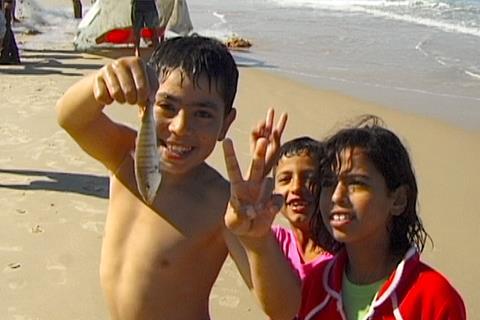Kamal Aljafari brings to Locarno a raw portrait of everyday life in Gaza, 2001, that chimes with current events

Dir: Kamal Aljafari. Palestine/Germany/France/Qatar. 2025. 106mins.
Kamal Aljafari offers a time capsule of footage from Gaza in 2001 in this vérité documentary drawn from three miniDV tapes that the Palestinian filmmaker, who is now based in Berlin, recently rediscovered. Initially intended as the basis for his debut film, which was never made, they were shot as Aljafari went in search of a man who had been imprisoned alongside him in 1989. He is guided by Gazan resident Hasan Elboubou, whose whereabouts are also now unknown. The result is a raw but poignant snapshot of Gaza during the Second Intifada, which is referenced by several of those who speak to the director.
The spectre of conflict hangs in the air
Although less experimental than A Fidai Film, Aljafari’s previous documentary, With Hasan In Gaza still employs an unusual structure that does not offer much in the way of context until deep in the running time. It means that although it is likely to enjoy a strong festival run, subsequent niche distribution is most probable after its premiere in the international competition in Locarno.
The handheld-camera journey — shot mostly by Aljafari himself — travels from the north of Gaza towards the south, documenting everyday activity along the way. It will be impossible for most people to watch this record of life unfolding without thinking about the current humanitarian crisis in Gaza as war continues following the Hamas attack and hostage-taking in Israel on October 7, 2023.
The spectre of conflict hangs in the air as Aljafari speaks to people near a market. While it is largely a vibrant space, some shops are shuttered, with one contributor observing “the economic situation has been bad since the last intifada”. A sense of economic gloom is mixed with humour as a group of men play cards in a barber’s shop. “Film the unemployed,” says one, while a second counters, “Film my bald head, make it look good!”
The current war also finds its echoes in the past as Aljafari is shown around a family home that has been shelled. There is a palpable sense of concern generated by the presence of the Israeli military, as more than once someone frets the camera may be mistaken for a weapon. He also talks to someone walking through the rubble of homes that were destroyed before people had any chance to pack, a moment that chimes with the more recent West Bank-filmed Oscar winner No Other Land.
At night, Aljafari’s camera watches as mortar fire is sent from Gaza into Israel and receives retaliation, its depressingly commonplace nature brought home by the way his guide can distinguish between the Israeli and Palestinian munitions purely by listening to them. Much of the sound used is diegetic, with the dangerous proximity of the conflict emphasised as weapons exchange is heard while the camera documents a child’s bedroom. Snippets of in-car music are also heard, coupled with spare and dissonant scoring from Simon Fisher Turner and Attila Faravelli, filled with mournful glissandos.
In a lighter moment, a group of children splash about in the sea, while their father tells Aljafari he is trying to make up for lost time with his kids after eight years in prison. These youngsters, in common with many who appear in the film, are excited by the presence of the camera, begging Aljafari to “take a picture of us”. It is a repeated demand that is likely to prompt many viewers to wonder where they — and those now the same age — are in the present day.
Aside from moving from one place to another, the editing appears minimal, presumably because Aljafari did not want to lose the dialogue exchanges. That strategy lends the film immediacy, but it means the camera is often unruly or sweeping about, which may make it a tricky watch for those prone to motion sickness. Given how personal this material obviously is to the director, With Hasan In Gaza might have benefited from more editorial collaboration. Just how personal becomes evident late in the film as the director offers a bleak recollection of his time in prison with the man he was seeking, presented in subtitled Arabic script, which appears on the screen rather than via narration. This fragment of memory merges with the footage, which in the act of being found by Aljafari acts as a reminder of so much that has been lost in the years since.
Production company: Kamal Aljafari Productions
International sales: Kamal Aljafari Productions, kamalaljafari.productions@gmail.com
Producer: Kamal Aljafari
Cinematography: Kamal Aljafari
Editing: Kamal Aljafari
Music: Simon Fisher Turner, Attila Faravelli
























